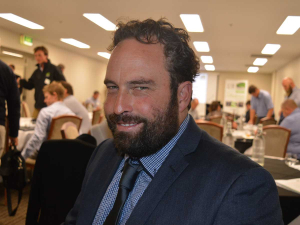Editorial: Having a rural voice
OPINION: The past few weeks have been tough on farms across the North Island: floods and storms have caused damage and disruption to families and businesses.
 Feds Richard McIntyre says the rural lobby is calling for the new Government to support an independent inquiry into rural banking.
Feds Richard McIntyre says the rural lobby is calling for the new Government to support an independent inquiry into rural banking.
OPINION: Farmers are doing it tough right now with rising costs, bad weather and falling payouts.
The last thing they want to be worrying about is whether they're getting a fair deal from their bank. The Commerce Commission is currently carrying out a market study into personal banking, looking at the levels of competition, what is or isn't working well and how things could be improved, but the terms of reference exclude rural business banking.
Farmers and rural communities deserve to have the same assurances that their banking systems are operating in a fair and proper way, so Federated Farmers is calling for the Government to support an independent inquiry into rural banking.
Federated Farmers' latest Banking Survey, carried out in May 2023, showed a noticeable upswing in the number of farmers who felt they had come under undue pressure from their bank. The survey also indicated that farm interest rates had increased sharply, with an average interest rate of 7.84% in May 2023, up 4% from a low of 3.79% in May 2021.
The average overdraft interest rate was 10.07% in May 2023, up 3.79% from a low 6.28% in November 2021. Those numbers will only have increased since May as interest rates have continued to climb, economic conditions have quickly deteriorated, and many farmers have rolled off their fixed rates.
Kiwi farmers are currently carrying around $63 billion of debt, so a 4% increase in interest rates means there will be $2.5 billion fewer dollars circulating in our rural economy.
Farmers are also noticing that banks charge much higher interest rates for farm lending than home loans. However, there seems to be no clear explanation why that's the case. We want to know if higher interest rates for farmers are increasing banks' profitability or cross-subsidising a much more competitive market for home loans.
Other emerging issues that an inquiry could look into include branch closures and new bank environmental requirements. Branch closures in rural communities really impact a farmer’s ability to access the services they need from their bank.
Farmers are running large and complex businesses and will often need to speak to their local bank manager faceto- face, particular in the tough times we are currently farming through. A strong relationship and access to working capital is absolutely critical.
Feds also have significant concerns about whether New Zealand banks’ participation in sustainability initiatives like the Net-Zero Banking Alliance are reducing competition in agricultural banking. Under this alliance, banks have collectively agreed lending strategies including setting 2030 targets for reducing the level of emissions associated with lending.
The BNZ is the first bank to announce a target in New Zealand. It wants to see a reduction in greenhouse gas emissions from dairy farming by 11% in the next six years. This banking alliance raises some very serious questions about whether our banks are acting in a truly competitive manner. Or if the joint commitment is effectively banks collaborating on a joint lending strategy.
Individual companies are free to put in place whatever requirements they like. However, we have a real issue when the main competitors are collectively setting requirements that leave farmers without choices.
There is potential for the Commerce Commission to consider what pre-competitive commitments banks in New Zealand can make before consumers rights to a competitive market place are compromised.
Richard McIntrye is Federated Farmers domestic commerce and competition spokesperson
Could a breakthrough in fermentation create a new multi-million-dollar export market for shiitake mushroom extracts into China?
Meadow Fresh has created the world's first fantasy sports league powered by real cows.
This year, 'Foodie February' sees potatoes take the spotlight as one of New Zealand's most powerful and versatile food heroes.
A multi-cultural team is helping to establish one of New Zealand's largest plantings of premium eating grapes - while learning each other's languages and cultures along the way.
The World Wide Sires National All Day Breeds Best Youth Camp Best All Rounder plaudit has become family affair, with 2026 Paramount Cup winner Holly Williams following in her sister Zara's footsteps.
DairyNZ is giving New Zealand farmers a unique opportunity to gain hands-on governance and leadership experience within the dairy sector.

OPINION: Meanwhile, red blooded Northland politician Matua Shane Jones has provided one of the most telling quotes of the year…
OPINION: This old mutt has been around for a few years now and it seems these ‘once in 100-year’ weather…